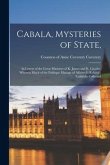The essays in this volume shed new light on Elizabeth I, exposing many of the public and private fantasies that she and her subjects used to manage their relations. In his introduction, Kirby Farrell points out that especially now, when Elizabeth has become an icon as familiar as Einstein, we underestimate and often euphemize the tangle of interpretive strategies that shaped the queen's identity and behavior. The childless "mother of her countrey" was revered for her wisdom and reviled for her homicidal tantrums, suffered clinical symptoms of traumatic stress, put to death her cousin Mary and her last lover, and in her coffin -- just before burial, as recounted in a text probed by Catherine Loomis -- literally exploded, as if her body could no longer contain all the lives, deaths, and volatile meanings stored up over its seventy years. To a core of eight essays first published in the journal English Literary Renaissance, the editors have added five new pieces. Frank W. Brownlow investigates the brutally scripted intimidation by which Elizabeth and her inner circle ruled a sprawling and often brawling kingdom, exposing a predatory side to the regime that has been too often glossed over in other histories. Barbara Freedman reads the "Documents of Control" to illuminate the monarch's authoritarian disposition and her paradoxically absolute yet ephemeral control over disorder. Richard Burt provides an account of the further adventures of Elizabeth's image in our own day. Burt brings a curious eye to incongruous treatments of her in mass media, even as he calls into question some conventional assumptions of historians and feminist critics. The anthology closes with Steven W. May's updatedbibliography of studies of the queen, opening the way to further inquiry.
Hinweis: Dieser Artikel kann nur an eine deutsche Lieferadresse ausgeliefert werden.
Hinweis: Dieser Artikel kann nur an eine deutsche Lieferadresse ausgeliefert werden.








